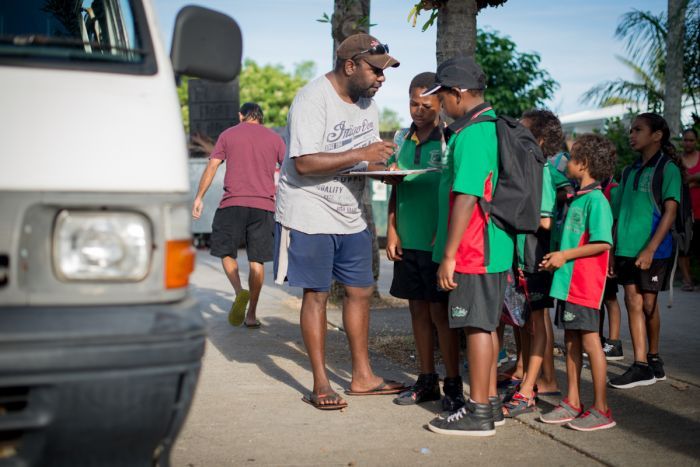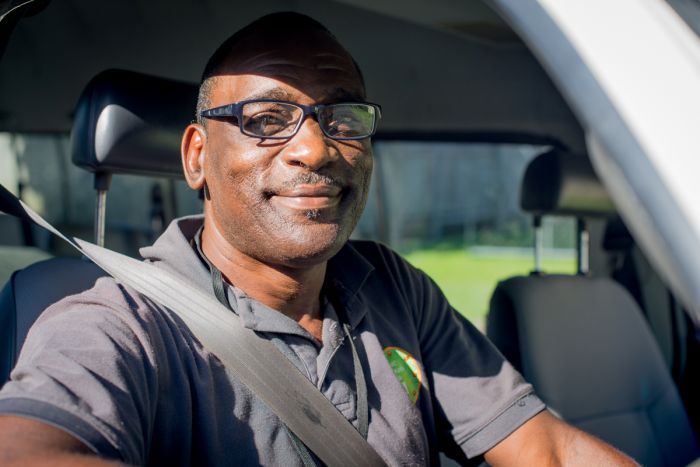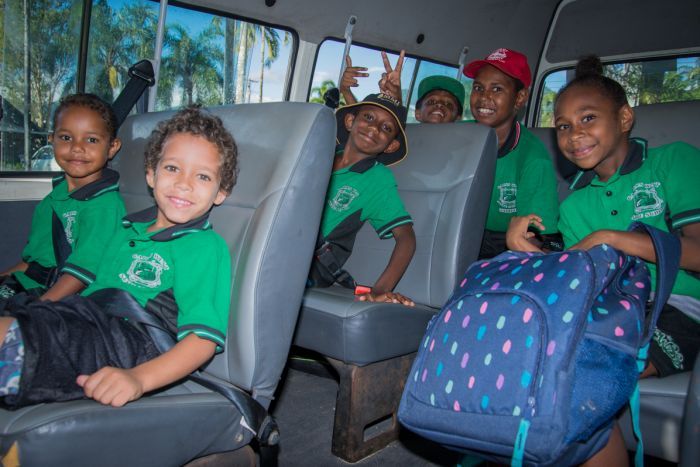Community driven school bus leads underprivileged students towards academic success in Cairns
Posted
 Photo:
Volunteer bus drivers check the names of students boarding the community school bus each morning. (ABC Far North: Mark Rigby)
Photo:
Volunteer bus drivers check the names of students boarding the community school bus each morning. (ABC Far North: Mark Rigby)
An unofficial school bus service driven by community volunteers is increasing school attendance rates for some of far north Queensland's most underprivileged students.
Before the free bus service began, children living in a west Cairns crisis accommodation centre were forced to walk more than 2 kilometres to school, and cross two busy roads during peak-hour traffic to get there.
The difficulty of getting to school meant some students' attendance rates were as low as 40 per cent last year.
Cairns West State School student services coordinator Cathy Nixon said since the bus service began this year, those students' attendance rates had reached 86 per cent.
"There's 12 children who take the bus who have achieved 100 per cent attendance for the first five weeks of school," she said.
"And for a couple of young boys whose attendance has improved out of sight, their reading levels have gone up two and three times in a matter of weeks."
Ms Nixon said the bus service was also increasing levels of engagement between parents and school staff.
"For families who haven't been sure about the school, they've had the opportunity to travel on the bus with their child," she said.
"That means we've been able to increase confidence in the school and confidence in education overall.
"We know these families think education is really important, but sometimes they need a little bit of extra assistance because the reality of their lives is more complex or challenging."
The good Samaritan driving change
The man behind the bus service, Reggie Jackson, works at an Indigenous Job Connections (IJC) community hub near the crisis accommodation centre the children call home.
Mr Jackson said he had felt compelled to help when he saw entire families walking past his office window on their way to school.
 Photo:
Reggie Jackson says words cannot describe how he feels about the smiles and thanks he gets from children on the bus. (ABC Far North: Mark Rigby)
Photo:
Reggie Jackson says words cannot describe how he feels about the smiles and thanks he gets from children on the bus. (ABC Far North: Mark Rigby)
"The parents were having to lug three other kids 2 kilometres to get one kid to school, and I can imagine doing that on a daily basis was really hard for them," he said.
"Then you might have a Grade 4 kid walking three preppies to school [and] crossing two major thoroughfares."
Mr Jackson said deciding to help struggling families get their children to school was "a no-brainer".
"The parents themselves are just like any other parent. They just want the best for their kids and they want them to go to school every day," he said.
"But they're doing it tough and what we're trying to do is make it a bit easier for them."
Reliable transport changes attitudes towards education
In the first week of the 2017 school year only nine students were using the bus service. By the fifth week that number had grown to 30.
The demand for the service has grown so much that Mr Jackson is now using two IJC vehicles to transport students to school, and has taken on volunteer drivers to assist him.
"The two guys I have driving now come into my office every day looking for work, so when I said 'Hey mate, would you like to volunteer?' they didn't even think twice," Mr Jackson said.
 Photo:
A safe and reliable way to get to school has improved the way these Cairns West State School students think about education. (ABC Far North: Mark Rigby)
Photo:
A safe and reliable way to get to school has improved the way these Cairns West State School students think about education. (ABC Far North: Mark Rigby)
A reliable mode of transport for the students has not only increased their school attendance and grades, it has changed their attitudes towards school.
"The kids are happier. They're just like normal kids now. You can see it in their face, you can see it in their smiles," Mr Jackson said.
"That's the beauty of it — just making it easy for them makes their day and their whole school experience a lot better for them."
Ms Nixon agreed and described the service as a win-win for everyone involved.
"Teachers can't teach kids if they're not at school, but for our teachers they get to see that their hard work pays off," she said.
"Kids are achieving which means teachers are happy, families are happy, win-win for everyone."
Topics: primary, indigenous-aboriginal-and-torres-strait-islander, children, volunteers, poverty, cairns-4870








